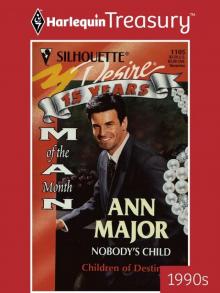The Accidental Bridegroom Read online
Page 4
“Yes…it was.” Cathy caught herself. She was supposed to be selling Sadie on Maurice.
But the child so wanted her to conjure up images of Rafe, and somehow, talking about him with his daughter tonight wasn’t nearly as hard as usual.
“Most of the time, he wore cowboy hats and boots,” Cathy said softly.
But not when he made love. He’d always been careful to take care of his hat and she’d been careful about his boots.
Sadie got up and tiptoed toward her mother. Reaching up, she reverently touched the locket. “And he gave you this?”
Cathy nodded.
“Because he loved you?”
For an instant, Cathy thought she might fly to pieces. Once she had believed that.
“That’s what he claimed.” Strange, how she sounded so utterly calm.
Her child’s seeking fingertips were soft and warm and loving against Cathy’s throat, the same way Rafe’s had been when he’d first fastened the locket there.
“And you wear it because you still love him?”
There was a wealth of hope, such a profound belief in romance and undying love in that small voice. Suddenly, Cathy felt old, old beyond her years as she gazed blankly down at her daughter.
The lies. The wretched, wretched lies. Why did there seem to be so many of them? And the biggest lie of all was that Sadie’s father couldn’t possibly come back from the grave.
And the reason he couldn’t was because he wasn’t dead.
No! The lying lowlife who’d pretended to love her to make his own job easier was very much alive. He’d taken money from Armi and used it to start his own international security business with Mike. And Rafe had made quite a name for himself protecting executives and celebrities and rescuing Americans held hostage in dangerous countries.
So much of a name that Rafe was a wanted man in Mexico, because it was widely believed that he’d broken into a Mexican prison three years ago. Supposedly, he’d handcuffed himself to a famous drug lord, Hernando Guillen, who’d been wanted for murder in the States, dragged him across the border and handed him over to the Houston cops. After Guillen was sentenced to death and the U.S. refused his extradition to Mexico, the incident had caused international repercussions.
When Armi had gone to Manuel in a rage over Rafe’s unprofessional romance with Cathy, Manuel had empathized, saying he’d had a similar problem several years back when he’d sent Rafe to Peru after his daughter, Consuelo, who had run off with a freedom fighter. When Consuelo had refused to leave her lover, Rafe had handcuffed her to himself and dragged her out of the jungle against her will. One week handcuffed to him in the jungle, and she’d come back madly in love—and no longer with her guerrilla soldier.
Manuel had philosophically held the view that Rafe had gotten both women safely through dangerous situations. He’d pointed out to Armi that Rafe had single-handedly tackled the hired hitman who’d attempted to shoot Armi at his political fundraiser in Memorial Park in Houston.
Cathy sighed. This very moment Rafe was probably protecting some other woman; probably making love to her, too. Her cheeks heated.
Cathy couldn’t bear to think about it. But there was no way she could tell her daughter the unsavory truths about her unscrupulous father. It was better that she believed in her fantasies.
“Yes, in a way…I suppose…I still love him…or the fantasy of him,” Cathy said, hugging her daughter close again. And at that, Sadie became very quiet and still, and, clutching the locket as though it were her greatest treasure, she slipped her other hand around her mother’s neck and kissed her.
Cathy remembered the night Rafe had given her the locket.
“Did you steal it?” she’d asked breathlessly, hopefully.
“No,” he’d said, his voice deep and husky. “It was my mother’s.” There had been a heart-stopping silence. “It was a gift from my father to my mother.”
“I—I won’t ever take it off.”
Then he’d crushed his mouth to hers and pulled her down on top of him on the bed.
But Cathy couldn’t tell Sadie that.
“He would be so proud of you, my darling Gordita,” Cathy murmured at last. “So very proud.”
Mother and daughter clung; Cathy feeling freer somehow because she’d survived a conversation about Rafe, Sadie fantasizing about the big, tall cowboy-father she would have given anything to know.
Later, Cathy would think it odd that Rafe, who had torn her life apart and made her an exile from her family for so long, had brought her this rare shining moment of closeness with her daughter.
But no moment, however rare and special, lasts forever, and all too soon Sadie picked up her basket and resumed shredding marigolds.
“Can I go show Juanito my witch costume?” Sadie asked after she plucked the last petal from a marigold and tossed another naked stem carelessly onto the others strewn about the floor.
Juanito was a seven-year-old orphan who Pita and several Indian housewives fed. His grandfather had been a silver miner and then a notorious bandit. Juanito was so smart and adorable the whole pueblo loved him. The boy slept wherever there was a spare bed, and when he couldn’t find a bed, it was rumored that he slept in the mines.
Cathy knew she should say no. She knew she should make her daughter clean up the messy pile of stems. Just as she knew she should find some way to talk to Sadie about Maurice.
But Sadie’s big blue eyes were as imploring as Rafe’s, and as Cathy bent down and began to gather the stems, all she could bring herself to say was yes.
Two
“Pita?”
Cathy’s voice held a crushed note from having failed yet again to talk to Sadie about Maurice.
“Aquí, mi vida. En la cocina,” Pita called welcomingly from the kitchen, which was redolent of the scent of tamales and green salsa.
Cathy hesitated inside the door, her gaze wandering in the darkness. A sliver of moonlight slanted eerily through a large crack in one wall and illuminated a huge altar. Three tiers of boxes had been draped with white satin.
Cathy pulled a string under a bare bulb. The dirt floor had been swept, the scarred tables and crucifix immaculately dusted. A plastic box of pins and scraps of black fabric were stacked on top of an ancient sewing machine. A small pair of scissors lay beside Pita’s larger ones; Sadie’s dragon stool had been pulled next to Pita’s.
Once when Cathy had asked Pita how she had the patience to sew or cook with Sadie around, Pita had replied, “From raising you, Flaquita.”
Little Slim. The Spanish nickname always disturbed her, for it was too close to Rafe’s.
Pita’s house might be humble, even dilapidated, but it felt more like home than any of the palaces Cathy had grown up in. And the status Pita had in this village as the daughter of the legendary Lupe was grander than any king’s. Indians from other villages still made pilgrimages to pay homage to her and to her mother’s house, which was practically a shrine.
When Pita had refused to move into the fine apartment Cathy had built for her beside her own house, Cathy had almost been glad. This beloved little shack had always been Cathy’s refuge whenever her own life had gone wrong.
Cathy studied the huge altar Pita was carefully building. Beneath Lupe’s stern photograph, Lupe’s famous diary that dealt with witchcraft lay open to a yellowed page, upon which she had inscribed her golden rule in Spanish.
To temper with the fate of a man causes a chain of events to be set into motion over which no one will have ultimate control.
On another, Lupe had written merely three words: Nothing is impossible.
Next to the diary were the empty black Oaxacan vases Pita would fill with marigolds, and a stack of white beeswax candles. On a lower shelf, a row of grinning sugar skulls leered up at her.
Cathy flipped through the diary until she came to the last page. The ink was so light it seemed to have soaked into the ancient parchment, and Cathy had to squint to make out the dim script.
At fir
st she thought it was some sort of recipe.
When she bent over it and read the title, her hands began to tremble.
No…
Yes, a silent voice boomed.
Just for an instant the room seemed to darken. The words leapt off the page and grew larger, glowing a sickly greenish yellow. Lupe’s photograph began to gleam with the same iridescent light.
As if burned, Cathy shivered and withdrew her hand from the page. It wasn’t a recipe.
It was a spell.
For true love.
Cathy’s shaky fingertips found the locket at her throat.
She felt her quick, jerky heartbeat as she remembered how she’d longed for true love. Then she thought of Maurice, and the long years of her life stretching before her seemed to promise no brightness.
If only…
Why did she have to remember riding on a motorcycle through a warm humid night, bronzed male hands clasped tightly around her narrow waist as her white chiffon skirts flew all over a hunk’s thighs encased in black jeans?
For a long moment, she just stood in the quiet, gripped by the wildest desolation and panic that the rest of her life, fairy-tale perfect as it might seem on the surface, would lack passion and adventure—and, most of all, love.
Then the words in the diary grew smaller and dimmer, the ink seeming to fade back into the page. Cathy tore her hand from the locket and drew herself up rigidly. She tried to smooth a wayward butter yellow tendril out of her eyes, but more hair tumbled down from her topknot.
Yearning for love had only brought her heartbreak. Maybe it was better not to love so deeply. Maybe then she wouldn’t be hurt so deeply. She saw herself being strengthened by Maurice’s responsible commitment, not torn apart as she had been by Rafe’s passion.
Besides, why should she take the spell of a mean old Indian woman seriously just because she’d been clever enough to trick ignorant villagers into believing she was a witch?
At that defiant thought, the dirt floor rumbled beneath her, and a violent red glare filled the room. A strange volcanic heat burned through Cathy. It was as if she stood before a blazing fire and was in danger of being roasted alive.
Shaking, Cathy’s gaze flew back to Lupe’s photograph, which still seemed to glow with an iridescent light. Lupe’s black hair was parted severely in the middle; her stern Indian features and high cheekbones would have seemed ordinary had her intense black eyes not held Cathy’s almost hypnotically.
Dear God… Was she going crazy from the strain of her impending wedding?
The hair on Cathy’s neck arched and she felt oddly cold, oddly warm—and truly frightened that there really might be something to all this, that she really might have made Lupe angry by doubting her power.
Cathy tried to reassure herself that she was crazy, that Lupe was dead, that there was no such thing as white magic.
But Lupe Sanchez had convinced everyone who had ever known her that there was such a thing and that she was the supreme mistress of it.
The villagers had revered her even as they had been terrified of her. Suddenly, Cathy remembered the way there had always been someone in Lupe’s kitchen whispering quietly, seeking the old woman’s help. Mothers of sick children, wives whose husbands had strayed, wives who wanted to reform their husbands who drank too much and beat them—they had all come to Lupe and bought her potions and powders, believing in the power of her spells.
They still came to Lupe’s daughter, and dear Pita tried valiantly to live up to her mother’s past glories. Unfortunately, poor Pita’s spells had a tendency to go haywire.
Not that the villagers had any complaints about the sick children, for Pita was talented with children. But Pita had never wanted to knuckle under to a macho husband, and she had refused to marry—saying that marriage for a poor woman in Mexico was slavery. Thus, Pita never had much luck when it came to mixing magic that had to do with romance or men.
The wives, who bought Pita’s potions because they wanted to reform their straying husbands all too frequently ran off to Mexico City with handsome young lovers. And there was the truly disturbing story of the very timid and long-abused seamstress Elsa Pacheco, who had come to Pita and paid for a magic potion to change her drunken lout, Abelardo, who beat her and their children every night, into a model husband.
Pita had taken Elsa’s money and dutifully concocted what she promised was her most powerful potion. Pita had instructed Elsa to pour it into the unsuspecting Abelardo’s pulque. But that very night, after swigging the pulque laced with Pita’s potion, the abusive Abelardo had come home even drunker and meaner than ever.
Wielding his knife, he’d chased all seven of the little Pachecos out of the house into the cornfield, even nicking a piece off the oldest son’s right ear. Then Abelardo had beaten his wife and made brutal drunken love to her before passing out like a dying bull on top of her.
Bruised and beaten, Elsa had become so desperate—because Pita’s spell had only made things worse—that she, a virtuous Catholic, succumbed to the temptation of stealing a single consoling sip of Abelardo’s pulque. After draining the second bottle, she’d called the seven little Pachecos inside and ordered them to help her sew ally the serapes they owned around Abelardo’s corpulent body until he was tightly sewn into his bed and more helpless than a prisoner in a straitjacket.
The next morning when he’d awakened with a roar and screamed for Elsa to let him go, she had quietly picked up the heavy iron she used to press her seams and beaten him until he’d wept for mercy, until he’d sworn between choking sobs to never touch pulque again if only Elsa would promise the same. And after that, although everyone knew that Pita’s spell had failed so abysmally, Pita somehow attracted even more clients. And Abelardo, who never drank pulque again, became the most docile and henpecked of husbands.
For one moment longer, Lupe’s portrait remained iridescent, and the air suddenly grew eerily cold and damp. For one moment longer, Lupe’s black eyes burned Cathy.
And Cathy, who couldn’t bear to hurt anyone’s feelings, knelt down repentantly before the portrait just in case.
“Oh, Lupe,” Cathy whispered, cowed into repentance. “I’m sorry. I meant no disrespect. It’s not your fault I don’t believe in witches. I…I almost wish I could. I wish life were that simple.”
When the floor trembled again, the sugar skulls clattered ominously.
Something cold and still seemed to caress Cathy’s cheek, and she shrieked.
Anything is possible, came a silent voice from behind her. Sensing an all-powerful, paranormal presence, Cathy jumped back from the altar. When the floor shook again, Cathy sprang up wildly, screaming for Pita.
“Momentito!” Just a minute!
At the sound of Pita’s warm, loving voice, Cathy felt reassured, almost back to normal.
Her short, fat coffee-colored nurse waddled out of the kitchen, wiping her hands on her white apron. “Did you feel the baby earthquakes?”
“Oh—”
Baby earthquakes. There were constant tremors in this region. Usually they didn’t mean much.
Still, Cathy couldn’t shake the feeling that Lupe had actually been there, so it was a long while before her tongue could become unstuck from the roof of her mouth.
Finally, when she could talk, she said, “Pita, your altar seems to get bigger every year.”
“Like me.” Patting her apron where it rounded over her belly, Pita grinned. She wasn’t the least bit ashamed of her rotund figure. “I have to build it.” She approached the altar and picked up her mother’s picture. “You know how everybody admired her.”
“I-I…know.”
“Everyone always comes here this time of year when she comes back… to pray for her help.”
“Uh, I’d rather not talk about…her coming back—”
“She’s been dead a long time, but they still believe in her powers far more than they do in mine,” Pita said, a little jealously.
“Oh, don’t feel bad,” Cathy
implored. “You’re wonderful in your own way.”
“She had so much talent and grandeur—she couldn’t understand why I wasn’t as talented.”
“My famous, talented mother doesn’t understand me any better.”
“Lupe tried so hard to teach me, but the spells—they are so complicated.” Pita brightened. “And then I always feel the need to add a little something extra—just to see what will happen.”
“Which is what makes you a wonderful cook! You are so creative!”
“But adding things to spells doesn’t work the way it does with recipes,” Pita murmured.
“Well, you never can tell. Maybe you’ll come up with the greatest spell that ever was! Maybe it’ll be so great, Lupe will turn green in her grave.”
“I wish!” But Pita said this so sadly, Cathy knew she was still dwelling on her failures. “I’ll have to try harder. But things have a way of going loco when I try something new.”
“Oh, Pita, I wish you—” Cathy stopped herself, suddenly feeling depressed and uncertain of the future. Where was she going with this? She didn’t believe in witchcraft. But she loved Pita too much to hurt her by saying so.
“What’s bothering you, my Flaquita?”
Cathy came into Pita’s arms. “I’m going to miss you, Pita.”
“You will have your new husband, your new life.”
Maurice’s castles were so far away. And they were too like Armi’s faux palaces. Somehow, Cathy didn’t think Maurice was going to allow her to come back to this village and her beloved Pita very often, and Pita had been the only person who’d ever seemed to genuinely love her just for herself. That was why Cathy had brought her child here, to this simple impoverished village, and tried to give her daughter the kind of warm, loving childhood she had never had herself.
For no reason at all, Pita’s words brought tears, and then Cathy was blurting out the truth to the one person she could really talk to.
“Oh, Pita. It’s everything. I can’t talk to Sadie about Maurice. I… Pita, I want to be in love, the way I was with—I want to be in love with Maurice.”
“There there, my little Flaquita. You told me you did love him—”

 The Girl with the Golden Gun
The Girl with the Golden Gun Silhouette Christmas Stories
Silhouette Christmas Stories To Tame Her Tycoon Lover
To Tame Her Tycoon Lover The Accidental Bodyguard
The Accidental Bodyguard Ultimatum: Marriage
Ultimatum: Marriage Marriage at the Cowboy's Command
Marriage at the Cowboy's Command Children of Destiny Books 4-6 (Texas: Children of Destiny Book 10)
Children of Destiny Books 4-6 (Texas: Children of Destiny Book 10) The Bride Tamer
The Bride Tamer Cowboy at Midnight
Cowboy at Midnight Her Pregnancy Secret
Her Pregnancy Secret Children of Destiny Books 1-3 (Texas: Children of Destiny Book 9)
Children of Destiny Books 1-3 (Texas: Children of Destiny Book 9) Terms of Engagement
Terms of Engagement The Accidental Bridegroom
The Accidental Bridegroom A Scandal So Sweet
A Scandal So Sweet Nobody's Child
Nobody's Child His for the Taking
His for the Taking The Girl with the Golden Spurs
The Girl with the Golden Spurs